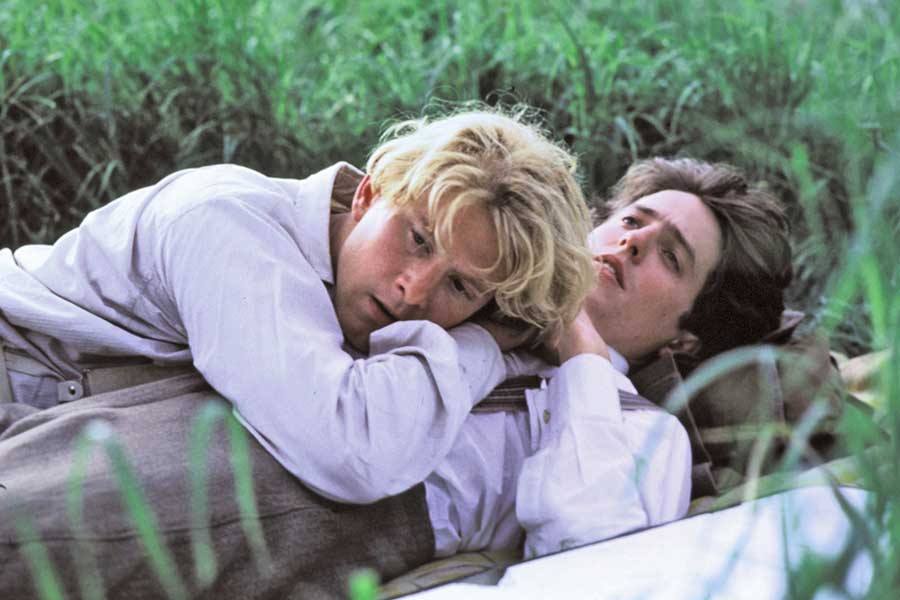“Maurice,” from out filmmakers James Ivory and Ismail Merchant, is receiving a 4K restoration release at Ritz Theatres in honor of its 30th anniversary. A classic film in the queer-cinema cannon, this heartfelt adaptation of gay writer E. M. Forster’s posthumously published novel is set in the Edwardian era. “Maurice” depicts issues of sexuality and class as the title character (James Wilby) falls in love first with Clive Durham (Hugh Grant) at Cambridge, and later with Alec Scudder (Rupert Graves), the irresistible gamekeeper at Clive’s estate.
The film remains as vivid and stirring today as it was on initial release. Ivory chatted with PGN about making “Maurice” and its reissue.
PGN: “Maurice” was one of the first overtly queer films you and Ismail Merchant made. What took you so long to make a gay film, and why was this one so important to do?
JI: Well, there are queer films, and then there are films with queers in them. Our films have had a lot of queer characters. Sometimes they were a little part, and sometimes, like in “The Bostonians,” a large part. The real reason I did “Maurice” was after making “A Room with a View,” I decided to reread all of Forster’s books. I read “Maurice” when it was published in the early 1970s. I liked it, but after “Room,” I thought it was the same story — about muddled young people who are forced by the society they are in to live a lie. I thought “Maurice” was the other side of the coin from “Room.” It sprang to life in my mind. “Room” was an enormous success, so we could do anything we wanted. I thought, Let’s do this. Nobody said we shouldn’t do it, or we should think twice about the subject matter.
PGN: The film is considered a classic of queer cinema. Did it seem so at the time?
JI: Oh, many people have come up to me and said how important “Maurice” was for them, how it changed their lives. I’m glad it had that positive effect. It might have had the other effect. It came out at the height of the AIDS crisis.
PGN: The film is a bit of a morality tale. Given the politics of the time, how would you have behaved back in the Edwardian era?
JI: I don’t know. I think I would have behaved as I wanted to. It’s hard to say, but I would have tried to find some way of living happily, so I am a Maurice type. When I was growing up, [being gay] was never really a big deal. I didn’t have to suffer. I was just lucky. I was living openly with Ismail in New York, London and particularly in India. We weren’t trying to fool anybody, and we were never threatened or anything like that — ever. Nor was any bad stuff or gossipy stuff written about us. Some folks are very religious and think of [gay] acts as sin. I was raised a Catholic, but I never had that guilt [imposed] on me.
PGN: The film’s sex scene is considerably romantic and erotic. Did you feel the film was too bold at the time, or did you use restraint?
JI: There was more nudity, but those scenes weren’t strong enough, so we dropped them. The sex was depicted as much as we could go. We didn’t want to make an X-rated movie. I would be a little hesitant to ask the actors to really perform, and I don’t think they would have; all three of the guys were straight. I did what I could, and hoped that was enough. I was so lucky those guys were willing to go along to the point they did.
PGN: What do you think about Maurice’s relationships with Clive and Scudder?
JI: Maurice wanted to sleep with Clive from day one, as soon as they went out into the countryside. And they would have; any other couple would have had sex lying there. Maurice was desperate to, but he feared pushing things too far and losing Clive, who would withdraw and reject him. I’ve known people like Clive, who stopped themselves from doing things they wanted to. Scudder was a free soul, I’ve always felt, and there are scenes of that in the film.
PGN: What are your thoughts about the film 30 years later?
JI: I‘ve seen it several times over the years and it’s always held up. It seems truthful and real. And it is romantic, of course, which is why women like it. It has so many female fans — especially women who were young girls the first time it came out. It’s not just a film that was attractive to gay men. When it came out in Japan, it was a craze for young women.
PGN: The film has a positive reception in the states, but did not fare well critically in England, as I understand.
JI: The critics in England were mostly gay, and they backed off from it because they thought they would be compromised; if they praised it too highly they’d come under social or editorial [scrutiny] so they backed off it. It had a good, long life in the cinema in England. I was told that the men’s room was a real scene in the theater.

